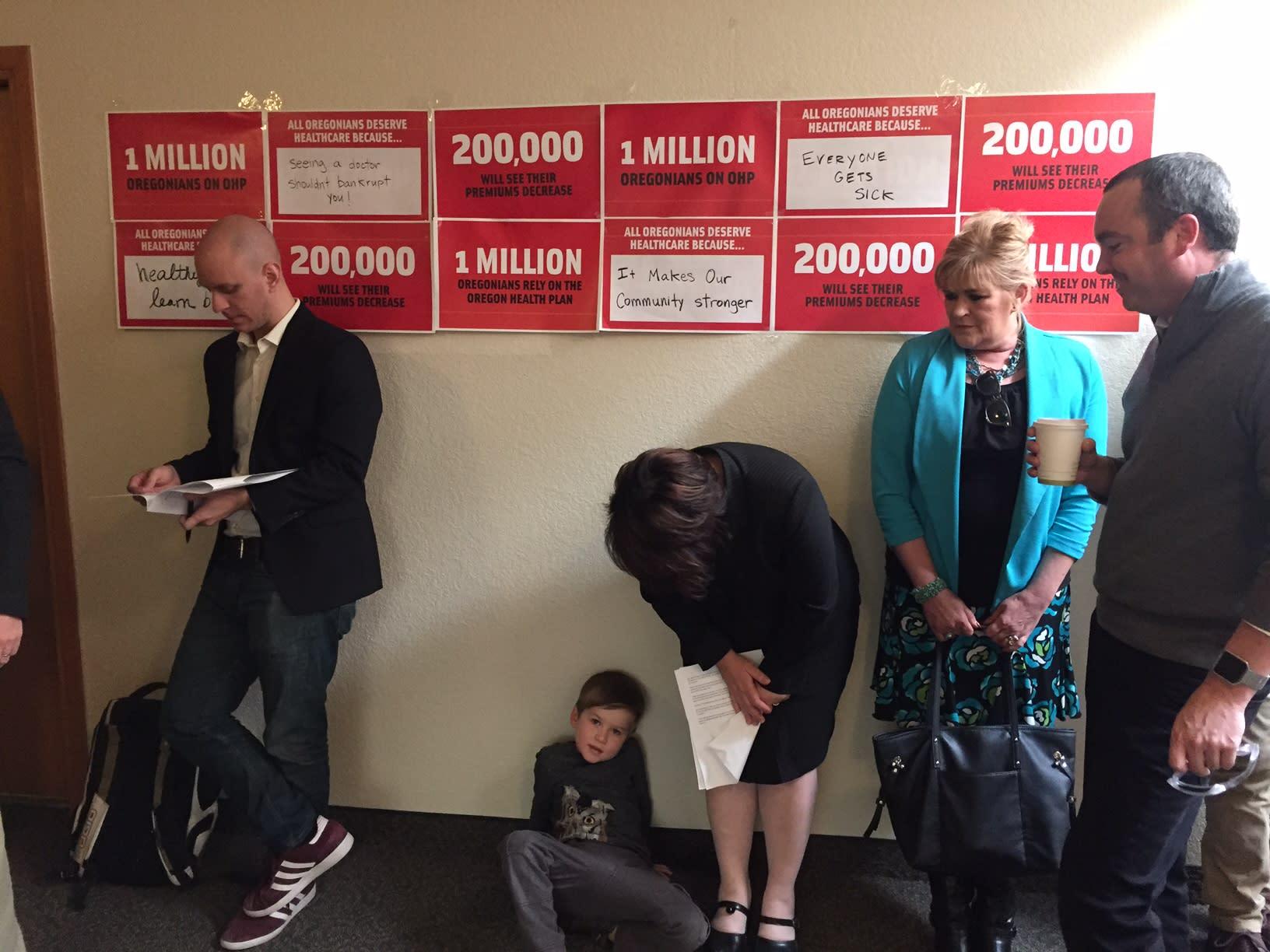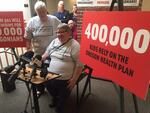
People wait for a press conference from the supporters of Referendum 301.
Kristian Foden-Vencil / OPB
Opponents of a recent Oregon bill to fund health care through a new tax submitted signatures Thursday to get a referendum against the tax on the ballot.
The group of Republican lawmakers opposing the tax submitted many more than the need 58,789 signatures to put Referendum 301 on the ballot.
It’ll be a while before the state has verified the signatures, but even supporters of the tax believe the referendum will make it to the ballot.
“We’re expecting that signatures will be filed [Thursday],” said Meg Niemi, president of SEIU Local 49, which wants to see the funding continue. “We would see it as a victory if they weren’t. But we are expecting that signatures will be filed to qualify Referendum 301.”
A referendum would give Oregon voters the chance to vote on the health care funding bill passed by lawmakers early this year. House Bill 2391 was designed to maintain insurance for more than 350,000 low-income people.
The bill generates the money to pay for expanded Medicaid coverage in Oregon by imposing a $670 million tax on health insurers and providers, many of whom supported the idea in the Legislature.
The tax would also fill a large portion of the state’s 2017-19 budget hole. Opponents of the bill say it will increase health care costs in the state.

Karen Escobar is a Medicaid recipient from The Dalles. She wants the referendum to pass because without medication, she says she's suicidal and can’t even boil water, because she forgets what she was doing, “The doctors prescribe medication, Medicaid pays for it. And I’m able to live on my own. And without that, I don’t know where I’d be,” she said.
Kristian Foden-Vencil / OPB
Karen Escobar is a Medicaid recipient from The Dalles. She has bipolar disorder and schizophrenia. At a rally in Portland Thursday, she said without medication she’s suicidal and can’t even boil water, because she forgets what she's doing.
“The doctors prescribe medication, Medicaid pays for it. And I’m able to live on my own," she said. "Without that, I don’t know where I’d be."
Escobar is hopeful that people will vote in favor of keeping the funding package.
West Linn Republican Rep. Julie Parrish launched the statewide effort to derail the tax soon after H.B. 2391 passed.
She said voters deserve the right to decide whether to shift costs for “a failing program.” Parrish also said she doesn’t like the idea of hard-wiring health care taxes into the law.
At this point the referendum wouldn’t mean all the taxes raised by H.B. 2391 would end, but about $330 million is on the line. If the referendum does get to voters, it’s not easy to understand. For example here’s the title as it stands:
“Provides funds currently budgeted to pay for health care for low income individuals and families and for stabilizing health insurance premiums, using temporary assessments on insurance companies, some hospitals and other providers of health insurance or health care coverage.”
A "yes" vote would approve the tax. A "no" vote would save money, but put the health insurance of 350,000 Oregonians in jeopardy, according to the tax supporters.
“They absolutely could be kicked off completely,” said Patty Wentz with the health care coalition.
“We’ve done it in the past. There’s no reason to think we wouldn’t do it again. Oregon used to have a health care lottery where we would draw names to determine who would have health care," Wentz said. "There’s no reason to think we wouldn’t go back to that if we didn’t have the funding.”
If Parrish’s signature gathering is successful, H.B. 2391 would automatically go on hold until a vote in January 2018.
The Legislature pulled the vote to January, instead of November 2018, because the earlier ballot gives lawmakers a chance to react in the February session if necessary.
Editor's Note: This story has been updated to reflect the number of valid signatures needed to qualify Referendum 301 for the ballot.
